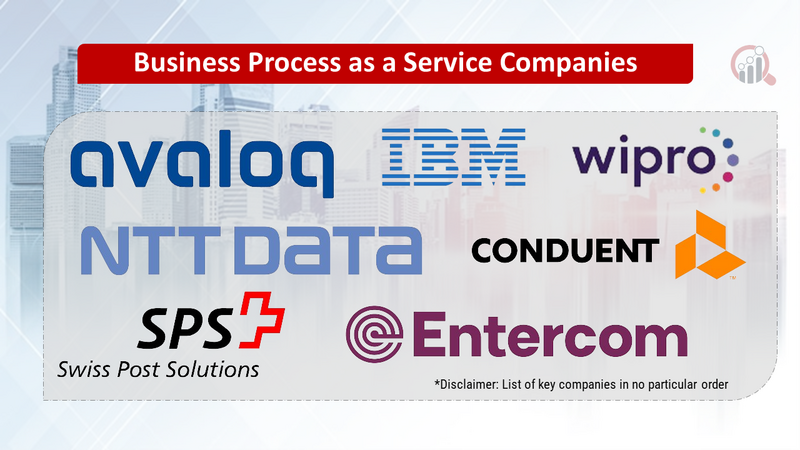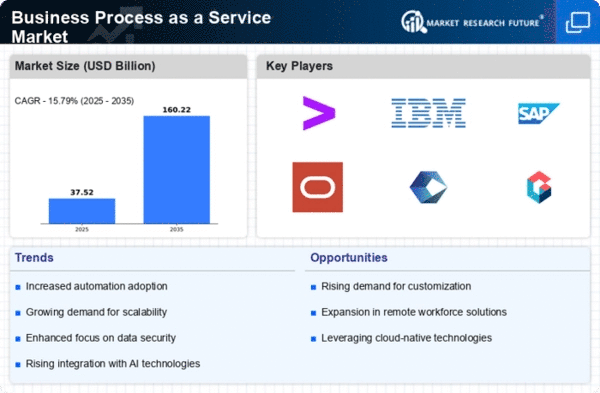Top Industry Leaders in the Business Process as a Service Market

Business Process as a Service Market: Dive into the Latest News and Updates
In today's fast-paced business environment, agility and efficiency are paramount. Organizations are increasingly turning to Business Process as a Service (BPaaS) solutions to optimize their core operations, reduce costs, and gain a competitive edge.
Some of Business Process as a Service Companies Listed Below:
- IBM Corporation (US)
- Wipro Limited (India)
- NTT DATA Inc. (Japan) Swiss Post Solutions Limited (Switzerland)
- Entercoms (US)
- Avaloq (Switzerland)
- Conduent Inc. (US).
Strategies Fueling Growth:
-
Industry-Specific Solutions: Developing pre-packaged BPaaS solutions designed for specific industries, like healthcare, finance, or manufacturing, addresses unique needs and simplifies implementation. -
Cloud-Based Deployment: Offering BPaaS on cloud platforms ensures scalability, accessibility, and minimizes upfront infrastructure investments for businesses. -
Artificial Intelligence and Automation: Integrating AI and RPA into BPaaS platforms automates repetitive tasks, improves decision-making, and drives process efficiency. -
Focus on User Experience and Integration: Providing intuitive interfaces, seamless integration with existing systems, and robust APIs simplify platform adoption and maximize user engagement.
Market Share Decoding: Key Factors to Consider:
-
Functionality and Feature Set: BPaaS platforms offering diverse process solutions, flexible configurations, and integration with other business applications cater to wider needs and attract larger customer bases. -
Industry Expertise and Vertical Focus: Platforms with deep understanding of specific industries and pre-built processes for those sectors cater to the needs of businesses within those verticals more effectively. -
Cloud-Based Delivery and Deployment Options: BPaaS solutions readily available on cloud platforms, with flexible subscription models and easy migration options, resonate with businesses seeking agility and cost-effectiveness. -
Security and Compliance Adherence: Robust security features, data privacy guarantees, and compliance with relevant regulations build trust and ensure data security for businesses adopting BPaaS.
New and Emerging Stars: Illuminating the BPaaS Path:
-
Hyper-Automation and Blockchain Integration: Startups like UiPath and Automation Anywhere explore integrating RPA with blockchain technology, enabling secure and tamper-proof transaction processing and automated record-keeping. -
Citizen Developer Tools and Low-Code Platforms: Companies like Nintex and Quickbase aim to empower business users with intuitive tools to build and customize simple workflows and processes, increasing agility and reducing dependence on IT teams. -
Cognitive Process Automation (CPA): Startups like Celonis and Olive automate complex decision-making processes using AI and machine learning, optimizing resource allocation and improving business outcomes.
Investment Trends: Where the BPaaS Dollars Flow:
-
Cloud-Native BPaaS Platforms: Investors are backing companies developing BPaaS solutions designed specifically for the cloud, with features like scalability, elasticity, and integration with other cloud services.
Latest Company Updates:
October 25, 2023:
-
Focus on vertical specialization: BPaaS providers are tailoring services to specific industries like healthcare, finance, and manufacturing.
November 17, 2023:
-
AI and machine learning (ML) integration accelerates automation: Robotic process automation (RPA) and AI-powered tools are streamlining workflows and minimizing human intervention. -
Focus on security and compliance: BPaaS providers prioritize robust data security measures and adherence to industry regulations.
December 8, 2023:
-
Microsoft expands Azure BPaaS offerings: Introduces new pre-built workflow templates and industry-specific solutions. -
Hybrid BPaaS models gain traction: Businesses adopt a combination of on-premise and cloud-based BPaaS solutions for flexibility and control.
January 9, 2024:
-
Focus on customer experience (CX): BPaaS providers offer solutions that improve customer interactions and support. -
Integration with IoT and edge computing: BPaaS platforms are adapting to handle data from connected devices and sensors for real-time process optimization.
January 10, 2024:
-
Demand for citizen developer tools: Easy-to-use tools empower non-technical users to automate simple tasks without coding. -
Rise of outcome-based pricing models: BPaaS providers base fees on achieved results, aligning their success with that of their clients.











